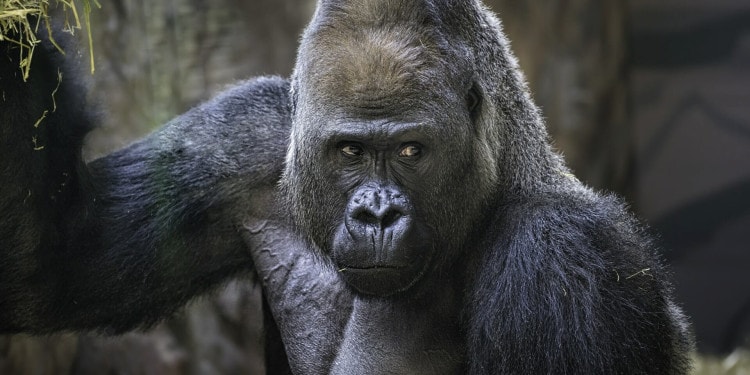Researchers from Osnabruck University and the Max Planck Institute for Evolutionary Anthropology in Leipzig, Germany, have observed Chimpanzees attacking and killing gorillas in the wild for the first time in Gabon, Africa. The observation was published in a report last week in the scientific journal Nature.
The two incidents recorded on video in Loango National Park both involved adolescent and adult chimpanzees outnumbering the adult gorillas. The victims, in both attacks, were infant gorillas.
Before the recent attacks, the observed relationship between gorillas and chimpanzees had been peaceful and at times even playful.
However, decreasing food stocks in Loango National Park, worsened by the effects of climate change, could be the cause of tensions between the animals. Live Science states: “Climate change is also reducing the amount of fruit available in the Gabon rainforest, something that could be creating even more competition, and therefore driving these aggressive interactions.”
Primatologist at the Max Planck Institute for Evolutionary Anthropology, and one of the report’s authors, Tobias Deschner, believes that the allocation of food between chimpanzees and gorillas may be instigating a certain rivalry. Deschner said:
“It could be that sharing of food resources by chimpanzees, gorillas and forest elephants in the Loango National Park results in increased competition and sometimes even in lethal interactions between the two great ape species.”
According to the report, the effects of seasonal issues alone may be causing the aggressive behaviour. The report states:
“[M]ost agonistic encounters [between animals] occur in seasonal environments when food is scarce, and killings decrease abruptly when dietary overlap is reduced. Gorillas and chimpanzees show considerable dietary overlap and have a relatively high potential for dietary competition.”
Related Articles: Conservation Through Public Health: Helping Gorillas to Co-exist With Humans | Forests for a Healthy and Resilient Society
What’s more, Mongabay reports that climate change is disrupting the production of fruit trees, which is an important source for mammals, such as chimpanzees and Gorillas.
In recent years, National parks in Gabon have experienced a “fruit famine” that has been detrimental for the wildlife. The University of Stirling in Scotland and the government of Gabon found that the country’s Lopé National Park has seen a whopping 81% decrease in fruit production between 1986 and 2018, as well as an “11% drop in the physical condition of fruit-dependent forest elephants since 2008.”
What Happened in the Attack?
The researchers who observed the lethal attacks in Loango National Park have been studying the behaviour of around 45 chimpanzees since 2014 and first observed this type of attack in 2019.
All chimpanzees are given a name, and the structure of their group, as well as their hunting characteristics, use of tools, and communication abilities, are recorded.
The leading author of the report and PhD student Lara M. Southern witnessed the first of the violent attacks. Southern said:
“At first, we only noticed screams of chimpanzees and thought we were observing a typical encounter between individuals of neighbouring chimpanzee communities. But then, we heard chest beats, a display characteristic for gorillas, and realised that the chimpanzees had encountered a group of five gorillas.”
Southern observed five gorillas, consisting of, a silverback, an infant and three females coming up against 18 chimpanzees in a thicket of the national park.
The silverback charged forward, grievously injuring a female adolescent chimpanzee.
Afterwards, 10 chimpanzees encircled the silverback “and repeatedly jumped down on and hit him whilst screaming and barking,” according to the report.
The infant was then separated from the adults who were fleeing the attack and was later killed by the chimpanzees.
In the second attack, after a silverback escaped from another violent assault, a group of chimps tried to take an infant gorilla from its mother’s arms. Eventually, the chimps succeeded, separating the infant from its mother and consequently taking its life.
Tobias Deschner, tells us that whilst the encounter presents a new discovery, there is still much more to be explored.“Our observations provide the first evidence that the presence of chimpanzees can have a lethal impact on gorillas,” Deschner said. “We now want to investigate the factors triggering these surprisingly aggressive interactions.”
Editor’s Note: The opinions expressed here by Impakter.com columnists or contributors are their own, not those of Impakter.com. — In the Featured Photo: A mountain gorilla. Featured Photo Credit: Greg Gollin.










